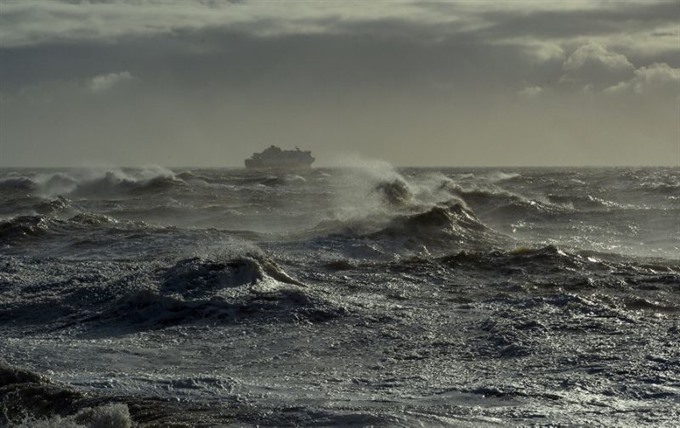 World
World

Ireland has ordered all schools to close on Monday as the country braces for an "unprecedented storm" with the arrival of Ophelia, the largest hurricane ever recorded so far east in the Atlantic Ocean.
 |
| Britain and Ireland braced for a lashing from Ophelia, the largest hurricane ever recorded so far east in the Atlantic Ocean, after it dumped heavy rains on Portugal’s Azores islands. — AFP/VNA Photo |
DUBLIN — Ireland has ordered all schools to close on Monday as the country braces for an "unprecedented storm" with the arrival of Ophelia, the largest hurricane ever recorded so far east in the Atlantic Ocean.
"In response to the imminent Storm Ophelia, the Department of Education and Skills is now publicly informing all schools, colleges and other education institutions that they are to remain closed tomorrow, Monday 16 October," the department said in a statement.
The decision followed discussions with the government’s emergency planning task force and advice "on this unprecedented storm" from Ireland’s Met Eireann national weather service, the statement added.
Met Eireann issued a nationwide "status red" alert and warned of "potential risk to lives" when the storm hits daytime Monday.
Although Ophelia will weaken as the storm travels over cooler seas towards the west coast of Ireland, Met Eireann forecast "violent and destructive gusts".
Heavy rain and storm surges are expected to lead to flooding.
An amber wind warning has been issued for Northern Ireland between 1400 GMT and 2100 GMT, when gusts could reach up to 130kph (80mph).
"By the time Ophelia reaches our latitudes, she will be weakening and will be an ex-hurricane," said Steve Ramsdale, chief forecaster at Britain’s Met Office national weather service.
"However, Ex-Ophelia will be bringing some significant impacts to Northern Ireland and western and northern Britain on Monday and Tuesday."
Scotland, Wales and parts of England were under yellow warnings issued by the Met Office, which forecast "very strong winds" and heavy rain in some areas.
Travel disruption
Prime Minister Leo Varadkar said on Sunday that defence forces were being deployed to areas due to be hit by the storm.
Ophelia is the 15th named storm of the 2017 Atlantic season, which is expected to last until the end of November.
Three major hurricanes -- Harvey, Irma and Maria -- caused catastrophic damage in the Caribbean and the US Gulf Coast.
Meteorologists say Ophelia is the most powerful hurricane recorded so far east in the Atlantic and the first since 1939 to travel so far north.
It was classed Category 3 on Saturday as it passed near Portugal’s Azores islands, which means it packed winds of at least 178km per hour.
When Ophelia reaches Ireland on Monday it is expected to weaken to a "post tropical storm", according to the US National Hurricane Centre.
"Mean wind speeds in excess of 80kph (50mph) and gusts in excess of 130kph (80mph) are expected, potentially causing structural damage and disruption, with dangerous marine conditions due to high seas and potential flooding," it said.
Flights, ferries and buses all face disruption. Cork Airport in southwest Ireland said "cancellations are likely" and urged passengers to check with their airlines in advance of travel.
Sea warning
Matt Crofts, a lifesaving manager with the Royal National Lifeboat Institution, said the seas could be "particularly dangerous and unpredictable".
"Stormy conditions may be tempting to watch but big waves can easily knock you off your feet.
"We understand why people want to experience extreme weather, but it’s not worth risking your life, so we strongly urge people to respect the water and watch from a safe distance."
Seven of the nine islands in the Azores were put on high alert for the storm’s passage, but it did not cause major damage, authorities told reporters.
Four trees were torn out of the ground on the island of Sao Miguel and firefighters responded to six incidents across the Azores to deal with small floods or landslides.
Several flights between the islands or to the Portuguese mainland were cancelled, affecting about 800 passengers. — AFP




